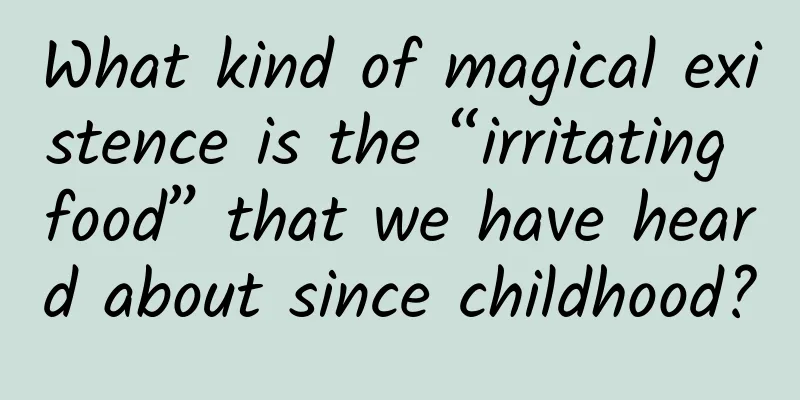What kind of magical existence is the “irritating food” that we have heard about since childhood?

|
"Mutton is fat, don't eat it" "Don't eat irritating foods when you have a cold, it will make the cold worse" "My resistance has been low recently, so don't eat irritating foods." ······ From childhood to adulthood, I seem to often hear about a kind of food called "fawu". When I am sick or injured, there is always something called "fawu" that I cannot eat. What kind of magical existence is “fawu”? What exactly is “hair stuff”? In fact, "fawu" is a folk saying, which was first recorded in "Puji Fang" in 1406. It mainly refers to foods that are easy to induce certain diseases (or uncomfortable symptoms) or easily aggravate existing diseases . There is no fixed type and range. Some foods can induce old diseases, aggravate existing diseases, or weaken the efficacy of medicine if they are eaten too much. This is the "fat nature" of food. What are the “hair products”? From the perspective of modern medicine and nutrition, the following types of food are generally considered to be irritants: 1. Foods that may easily cause allergies Anything that runs on the road or swims in the water may trigger allergies, such as cattle, sheep, free-range chickens, as well as fish and seafood. Allergic diseases are mostly caused by allergic foods, and allergens are all proteins, so these protein-rich foods are considered to be allergic foods. Tropical fruits are also called "allergic foods" because of their allergic reactions. 2. Spicy food For example, foods such as peppers and onions. Excessive intake of spicy foods can easily irritate the digestive tract, causing gastrointestinal burning, aggravated abdominal pain and other digestive tract symptoms. 3. High-purine foods Foods with high purine content, such as seafood and offal, will aggravate the condition during an acute attack of gout. They are "trigger foods" for gout patients and should be avoided. So, is it true that the so-called “irritating foods” cannot be eaten at all? The answer is of course NO! Tips on “hair-raising food” There are three possibilities why irritants may cause old illnesses to relapse or worsen: 1. Some animal foods contain certain hormones that may cause certain hyperfunctions or metabolic disorders in the human body. 2. The foreign proteins contained in certain foods become allergens , causing recurrence of allergic diseases; seafood itself contains histamine, which can increase vascular permeability, plasma exudation, edema and increase eosinophils, thereby leading to allergic reactions. 3. Some highly irritating foods such as alcohol, onions, garlic, etc. can easily cause the spread of inflammation to inflammatory lesions. A certain type of food may be considered an "irritant" for some patients, but may have an auxiliary therapeutic effect for another type of patient. For example, for those with a hot constitution, mutton is an "irritant", but for those with a cold constitution, it is not a problem. Sweet and greasy foods may be "irritants" for those with phlegm and dampness and obesity, but not for those with insufficient body fluids. Clinically, irritants may induce or aggravate certain diseases, but on the other hand, in the treatment of some diseases, irritants can also be used to promote or induce irritation, which can help the disease to break out and shorten the course of the disease. For example, blood-activating foods that are not suitable for patients with hemorrhagic diseases can be used to prevent and treat blood stasis headaches and periarthritis of the shoulder; in the early stages of measles, when the rash is not breaking out smoothly, mushrooms, bamboo shoots and other irritants can help it break out and shorten the course of the disease. Eating more seafood-flavored irritants can promote the outbreak of cowpox, etc., all of which utilize the irritant's ability to break out. Therefore, whether or not to eat "irritating foods" also depends on your physical condition. Currently, the issue of "irritating foods" does not have much scientific basis. It should be said that as long as there is no allergic reaction or food intolerance, and there is no adverse reaction after eating these things, you can eat less of them, but not not eat them at all. |
Recommend
Full quality control from farm to table. The familiar JD.com has installed a smart brain in the refrigerator
JD.com, which advocates quality life, has gone of...
With the refinancing, LeTV will continue to lead the content market by raising copyright barriers
The largest financing case on the GEM has been bo...
5 major growth types of brand marketing!
First, let me say the golden sentence: Five growt...
Product traffic methodology: How to find your precise users?
There are many people who have learned many metho...
618 group buying venue event promotion methods and review!
This article reviews the 618 group buying event t...
How to do 315 crisis public relations?
Tomorrow, CCTV’s annual “selecting troops and gen...
How to do Christmas marketing? Here are 3 ways and 10 cases
The afterglow of “Double Twelve” has not yet fade...
Snowden says US government hacked global mobile networks
Documents from Edward Snowden released by The Int...
Unlock advanced methods of operating WeChat public accounts!
In addition to the conventional gameplay, what el...
NetQin Lingdong and its two swords join forces to become a bridge between the upstream and downstream of the smart car industry chain
With the transformation and upgrading of the auto...
Mini Program Optimization Suggestions
Currently, the mini program optimization suggesti...
In November 2023, the sales of China's new power car companies were obviously differentiated, and only Ideal made a profit of 2.8 billion in Q3
The sudden crash of Jiyue Automobile left a mess ...
The world's first OpenAI robot was born, which can interact with people autonomously丨Tech Weekly
Compiled by Zhou Shuyi and Wang Xiang Starship su...
What exercise hurts your knees the most? You definitely didn’t expect…
Once you sit down, how long do you sit? 1 hour? S...
13-year-old boy tested positive for "drugs" twice in a row after having flu! Don't take this kind of drugs randomly!
This winter, respiratory infections continue to b...









